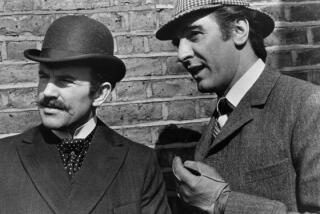Discoveries
- Share via
-----
When You Catch an Adjective, Kill It
The Parts of Speech, for Better and/or Worse
Ben Yagoda
Broadway Books: 256 pp., $21.95
“I am not one of those whatever-is-is-right loose constructionists,” insists Ben Yagoda, Homo grammaticus, professor of English and frequent commentator on language. Nevertheless, he continues, “some new adjectives make me Sad to Be Alive.”
It takes a certain sensitivity to be undone by unnecessary modifiers (“very cliched,” say). No matter how easygoing a grammarian pretends to be, do not relax your guard around them, for they are an extremely judgmental lot, a tribe beset by bickering.
Yagoda invokes one of his forefathers, the Greek grammarian Dionysius Thrax, who around 100 BC invented the idea of dividing speech into parts (nouns, verbs, adverbs, articles, conjunctions, prepositions). He also clearly admires the ferocity of founding New Yorker editor Harold Ross. The English professor is downright caustic when it comes to the despised adverb (especially the word “actually”).
Yet as he takes us through the parts of speech, the tone is one of fondness and tolerance, laced with that schoolmarmish tone one senses in Strunk and White’s “Elements of Style” and sometimes even in the Chicago Manual of Style. He quotes a passage from Daniel Duncan’s “New English Grammar” (1731) that helps to convey the gentle purpose of the whole enterprise: “It is the good or bad Use of Conjunction, that constitutes the Essence of a good or bad Stile. They render the Discourse more smooth and fluent. They are the Helpmates of Reason.”
*
-----
A Tale of Two Lions
A Novel
Roberto Ransom, translated from the Spanish by Jasper Reid
W.W. Norton: 112 pp., $19.95
ROBERTO RANSOM, who is of Irish American heritage, was born and raised in Mexico. He has written this beguiling folly of a novel in three acts. “A Tale of Two Lions” calls to mind the sparkling playfulness of Alexander Calder, Monty Python or Italo Calvino.
In the first act, we meet Cattino, a lion raised from a cub by the Countess Sophia. Her relationship with Cattino makes her husband, Count Lorenzaccio, extremely jealous. When she takes Cattino to New York, the lion mysteriously disappears.
In the second act, we meet Jeremiah Jones, a pith-helmeted, jodhpur-clad museum guard who believes that a stuffed lion in the museum’s collection, named Pasha, is not stuffed at all, but real. Both lions reappear in the third act, at an Italian circus, as majestic symbols of the male ego at its finest, surrounded by clowns and jealous lovers and the eccentric vestiges of colonial domination.
Ransom has written, among other things, several children’s books. This is the first of his works to be translated into English.
*
-----
Kidnapped
A Diary of My 373 Days in Captivity
Leszli Kalli, translated from the Spanish by Kristina Cordero
Atri Books: 320 pp., $14 paper
LESZLI KALLI was 18 when she and her father were taken hostage, along with 30 other airline passengers, on April 12, 1999.
They were flying from their home in Bucamaranga, Colombia, to Bogota, where Kalli planned to catch a flight to Madrid and thence to Tel Aviv. In Israel she hoped to escape the shallow, spiritually empty life of a wealthy teenager by working on a kibbutz. The hijackers were National Liberation Army guerrillas, and although they treated their captives with consideration and politeness, the long forced marches through the jungle, the rough huts, the snakes and the poor food took their toll on the hostages.
With her youthful eye trained on the relationships and the tensions that arose within the group, Kalli offers us a new perspective on the human mind in captivity. “If it weren’t for these pages,” she writes of her diary, in which she includes dreams, drawings and letters to her captors, “I would have no way of letting go of all the things I feel, I would feel so much more alone.”
More to Read
Sign up for our Book Club newsletter
Get the latest news, events and more from the Los Angeles Times Book Club, and help us get L.A. reading and talking.
You may occasionally receive promotional content from the Los Angeles Times.










